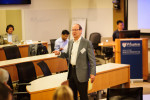
Vigilant organizations excel at seeing looming threats and embryonic opportunities sooner than rivals, which prepares them to act faster when needed. Four drivers distinguish vigilant from vulnerable organizations, which can be used to design a roadmap to improve organizational acuity and preparedness.…Read More











